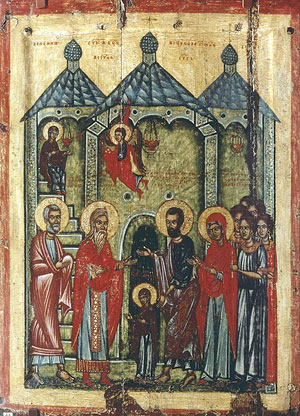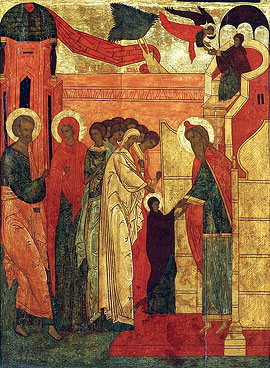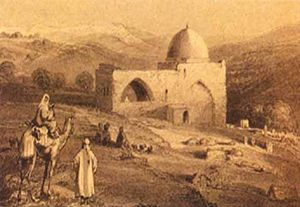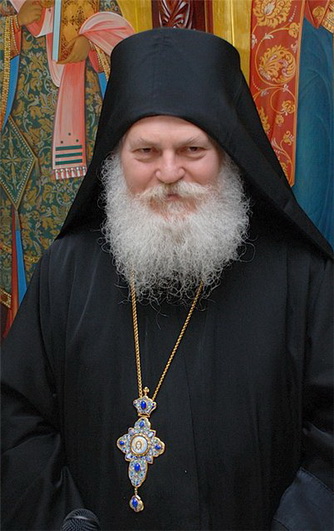Theology
The House of God. Homily on the Day of the Entry of the Theotokos into the Temple
6. December 2011 - 14:27 Let us faithfully praise the Virgin Mary,
Let us faithfully praise the Virgin Mary,
for she is brought into the Holy of Holies,
to be raised in the Lord.
Ekos from Matins
On this day, my brethren, the holy Church celebrates the solemn Entry into the temple in Jerusalem of the three-year-old child, Mary—the blessed daughter of righteous parents, Joachim and Anna—to be in instructed in the Lord. Zacharias—the elder and high priest—meets her with priestly splendor; and as he was instructed to do by the Spirit of God, he brings her, accompanied by young maidens, into the most interior part of the temple, the Holy of Holies, where the high priest himself enters but once a year, and where the Holy of Holies, the Lord Himself dwelt—for she was to become the Mother of His flesh.
Entry of the Mother of God into the Temple
6. December 2011 - 14:21 If a tree is known by its fruit, and a good tree bears good fruit (cf. Mt. 7:17; Lk. 6:44), then is not the Mother of Goodness Itself, She who bore the Eternal Beauty, incomparably more excellent than every good, whether in this world or the world above? Therefore, the coeternal and identical Image of goodness, Preeternal, transcending all being, He Who is the preexisting and good Word of the Father, moved by His unutterable love for mankind and compassion for us, put on our image, that He might reclaim for Himself our nature which had been dragged down to uttermost Hades, so as to renew this corrupted nature and raise it to the heights of Heaven. For this purpose, He had to assume a flesh that was both new and ours, that He might refashion us from out of ourselves. Now He finds a Handmaiden perfectly suited to these needs, the supplier of Her own unsullied nature, the Ever-Virgin now hymned by us, and Whose miraculous Entrance into the Temple, into the Holy of Holies, we now celebrate. God predestined Her before the ages for the salvation and reclaiming of our kind. She was chosen, not just from the crowd, but from the ranks of the chosen of all ages, renowned for piety and understanding, and for their God-pleasing words and deeds.
If a tree is known by its fruit, and a good tree bears good fruit (cf. Mt. 7:17; Lk. 6:44), then is not the Mother of Goodness Itself, She who bore the Eternal Beauty, incomparably more excellent than every good, whether in this world or the world above? Therefore, the coeternal and identical Image of goodness, Preeternal, transcending all being, He Who is the preexisting and good Word of the Father, moved by His unutterable love for mankind and compassion for us, put on our image, that He might reclaim for Himself our nature which had been dragged down to uttermost Hades, so as to renew this corrupted nature and raise it to the heights of Heaven. For this purpose, He had to assume a flesh that was both new and ours, that He might refashion us from out of ourselves. Now He finds a Handmaiden perfectly suited to these needs, the supplier of Her own unsullied nature, the Ever-Virgin now hymned by us, and Whose miraculous Entrance into the Temple, into the Holy of Holies, we now celebrate. God predestined Her before the ages for the salvation and reclaiming of our kind. She was chosen, not just from the crowd, but from the ranks of the chosen of all ages, renowned for piety and understanding, and for their God-pleasing words and deeds.
The Nativity Fast: A Time of Preparation
1. December 2011 - 15:19 The Fast of the Nativity is the Church's wise solace and aid to human infirmity. We are a forgetful people, but our forgetfulness is not unknown to God; and our hearts with all their misconceptions and weakened understandings are not unfamiliar to the Holy Spirit who guides and sustains this Church. We who fall far from God through the magnitude of our sin, are called nonetheless to be close to Him. We who run afar off are called to return. Through the fast that precedes the great Feast of the Incarnation -- which itself is the the heart and substance of our calling -- the Church helps draw us into the full mystery of what that call entails.
The Fast of the Nativity is the Church's wise solace and aid to human infirmity. We are a forgetful people, but our forgetfulness is not unknown to God; and our hearts with all their misconceptions and weakened understandings are not unfamiliar to the Holy Spirit who guides and sustains this Church. We who fall far from God through the magnitude of our sin, are called nonetheless to be close to Him. We who run afar off are called to return. Through the fast that precedes the great Feast of the Incarnation -- which itself is the the heart and substance of our calling -- the Church helps draw us into the full mystery of what that call entails.
Archimandrite Ephraim: "Do Not Look for Joy Outside of Yourself"
1. December 2011 - 15:13A talk given in the New-Tikhvin women's Monastery, Ekaterinburg, Russia, October, 2011, during the visit of the Cincture of the Mother of God to Russia.
 Your Eminence, eminent bishops, honorable fathers, dear Mother Abbess, brothers and sisters! It is a great joy for me to be in your monastery once again. As you know, this time we have arrived with the holy Cincture of the Mother of God. This is a very special holy shrine — very precious from the spiritual point of view. By God's providence we have brought the relic to this city in order to sanctify the city, and of course, for the sake of the monastics who live here. We know how pleasing the monastic life, and in general the existence of monasteries is to the Mother of God. We know how many times in the history of the Church the Mother of God appeared to chaste and pure souls and said, "There is my icon, take it and build a monastery." The Holy Mountain is the only existing monastic republic, dedicated entirely to her. The Most Pure Virgin is the Protectress of Mt. Athos. She herself told St. Peter the Athonite to go and live on the Holy Mountain, and said that he and his co-strugglers will be under her direct Protection. "I myself will be your Protectress, Healer, and Nourisher," she said. Appearing to St. Athansius the Athonite, she said the same thing she had said to St. Peter, adding, "I will be your Economissa (steward) and I will take care of all of you; but I want only one thing from you—that you keep your monastic vows." And to this day we, the Athonites, delight in her patronage and special intercession.
Your Eminence, eminent bishops, honorable fathers, dear Mother Abbess, brothers and sisters! It is a great joy for me to be in your monastery once again. As you know, this time we have arrived with the holy Cincture of the Mother of God. This is a very special holy shrine — very precious from the spiritual point of view. By God's providence we have brought the relic to this city in order to sanctify the city, and of course, for the sake of the monastics who live here. We know how pleasing the monastic life, and in general the existence of monasteries is to the Mother of God. We know how many times in the history of the Church the Mother of God appeared to chaste and pure souls and said, "There is my icon, take it and build a monastery." The Holy Mountain is the only existing monastic republic, dedicated entirely to her. The Most Pure Virgin is the Protectress of Mt. Athos. She herself told St. Peter the Athonite to go and live on the Holy Mountain, and said that he and his co-strugglers will be under her direct Protection. "I myself will be your Protectress, Healer, and Nourisher," she said. Appearing to St. Athansius the Athonite, she said the same thing she had said to St. Peter, adding, "I will be your Economissa (steward) and I will take care of all of you; but I want only one thing from you—that you keep your monastic vows." And to this day we, the Athonites, delight in her patronage and special intercession.

